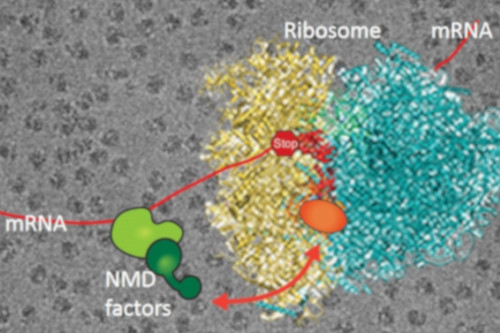Messenger-RNA (mRNA) carries the genetic information from our DNA for protein production inside our cells. However, at times mRNAs contain errors which can give rise to shortened proteins, these can be toxic to our cells and cause severe disease.
Fortunately, cells have devised a vital quality control mechanism called NMD, to recognise and eliminate some faulty mRNAs. Despite the importance of the mechanism we still do not understand how faulty mRNAs are recognised and marked for elimination.
The new award will be used to validate a recent discovery by Christiane Berger-Schaffitzel’s lab, showing the role of a key protein in the recognition of faulty mRNAs. By using electron cryo-microscopy (cryo-EM), Berger-Schaffitzel’s team will be able to visualise (at near-atomic resolution) how this protein, and others, interact with faulty mRNA and to discover their impact on health and disease.
Professor Christiane Berger-Schaffitzel said: “I feel very honoured to receive a Wellcome Trust Investigator Award. I am excited to be given the chance to contribute to our understanding of NMD, a mechanism linked to more than 20 percent of the genetic diseases caused by single-base pair mutations.”
Failure of cells to degrade faulty mRNAs are implicated to be the starting point for many genetic diseases, including non-syndromic intellectual disability, autism and schizophrenia. Understanding the molecular events triggering NMD will be instrumental for the development of future therapies to treat such diseases.
To succeed, Berger-Schaffitzel’s team will bring to bear a whole array of sophisticated tools in which they excel, ranging from molecular and synthetic biology, to state-of-the-art high-resolution structure determination by cryo-EM. They will use Bristol’s newly acquired £2.2M microscope in the GW4 Cryo-EM Facility funded by Wellcome Trust Equipment Grants, spearheaded by Berger-Schaffitzel.
